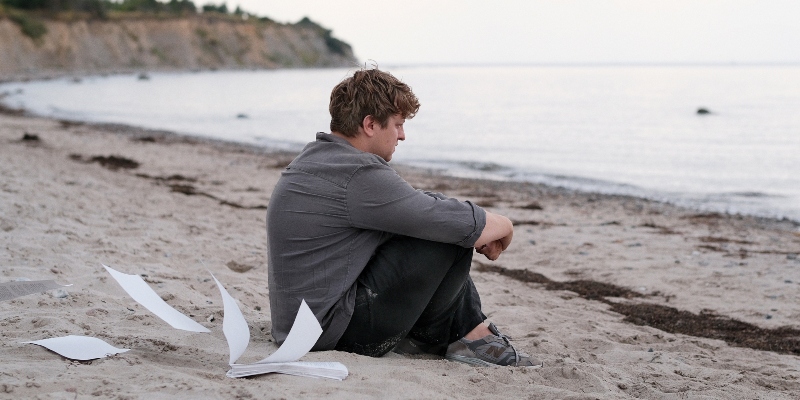The German filmmaker Christian Petzold has often incorporated books and literature into his work: Barbara (2012) was based on a German novella and borrowed passages from W.G. Sebald; Undine (2020) reinterpreted a mermaid myth; Jerichow (2008) was inspired by James M. Cain’s The Postman Always Rings Twice. Other times, texts become totemic objects, like the manuscript in Transit (2018), which itself is based on Anna Segher’s novel. The literary bent of Afire, however, takes a different approach as an original character study of a self-absorbed writer.
Leon (Thomas Schubert) joins his friend Felix (Langston Uibel) summering on the Baltic sea. He needs to work on his book, and Felix his art school portfolio—at least that’s the plan. Everything goes awry, almost immediately: “Something’s wrong,” Felix says in the film’s opening, just before his Mercedes sputters to a stop in the forest, forcing them to walk the rest of the way to the bungalow.
While these initial scenes set an ominous tone, Afire is not a horror story, though it does depict the mundane terrors of writerly existence as Leon tries and tries to finalize his second novel, absurdly titled Club Sandwich. Later in the film his agent Helmut (Matthias Brandt) pays a brief visit to give notes and read the text aloud, offering viewers a glimpse of the uninspired and insipid writing.
Arriving at the bungalow, the friends are met with another surprise: Felix’s mother has granted a stranger, her colleague’s niece Nadja (Paula Beer), permission to stay in the house, too. At first Nadja exists only as a ghost, the invisible guest who leaves the dining table strewn with plates of half-eaten lasagna. Scooping ice cream by the shore during the day, and hooking up with the local lifeguard Devid (Enno Treb) by night, she is heard before she is seen, much to Leon’s frustration.
Felix is more hospitable to her free-spiritedness, but Leon grows grumpier by the hour, his obstinance invariably made worse by his lack of sleep due to Nadja’s nocturnal activities. The gurgling of a coffeemaker, the buzz of insects, the unidentifiable hum of machines produce a sonic landscape of ambient disturbances that accentuates Leon’s distracted state of mind.
Schubert is effectively unlikable as the pompous Leon, abstaining from any manner of fun because his “work won’t allow it.”
Cloddish and perpetually appearing in a state of discomfort, Schubert is effectively unlikable as the pompous Leon, abstaining from any manner of fun because his “work won’t allow it.” His egotism is so great that he fails to recognize the threat of forest fires looming on the edges of town as a real material threat. At his best, Leon is merely condescending, mocking people’s grammar, and at his worst a nasty victim of his own insecurity, which is never more apparent and acute than around Devid the lifeguard, who is as comfortable with himself as Leon is not. Who else wears black and a pair of New Balances to the beach? Aside from looking seasonally out of place, Leon’s minimalist outfit, which radiates hip nonchalance, belies his validation-seeking anxieties.
While many of Petzold’s previous films are haunted by Germany’s past and entrenched in historical and political circumstances that shaped it, Afire is a breezy and untroubled comedy of manners. The French have their summer films, a romantic subgenre set during the warmer months and the country’s les grandes vacances—why shouldn’t the Germans?
Taking cues from Eric Rohmer, if not a pioneer than a master of this class of movie, Afire examines interpersonal relationships but unsatisfyingly renders its characters more as ciphers than real people, particularly the enigmatic and idealized Nadja, who seems to exist solely for the maturation of the male protagonist. By the end of the film, however, in which Petzold orchestrates a narrative sleight of hand, you get the feeling that that’s part of the point.
The film is most successful in its depiction of stymied creativity, which Petzold ties to one’s inclinations for diversion and the capacity to let loose. While Felix and Nadja gaily make use of their free time, whether languorous dinners al fresco or fixing up the roof, Leon is never not working.
In reality, under the pretense of work he idles the hours aimlessly bouncing a tennis ball or listening to records, rushing back to his makeshift desk as soon as someone returns to observe him. He’s less a slave to writing than to the pretense of labor, more enamored with the notion of being a writer than the act itself, which he deploys as a convenient shield, one that allows him to skirt social obligations or belittle the others, whom he sees as undisciplined revelers.
Just as someone once said “Life is what happens to you while you’re busy making other plans,” writing happens when you’re not trying to write. Felix takes an inspired series of photos at the beach in spite of enjoying himself; Nadja occupies herself with cooking, cleaning, and caring, while also holding mental space for rigorous intellectual pursuits—it turns out that she isn’t just a frivolous pleasure seeker but a graduate student diligently working on a thesis about Heinrich Heine. Who else but Petzold would center his film’s major revelation around such an inconspicuously loaded twist?
Felix and Nadja, and their work, leave a lasting impression on Leon’s agent Helmut. Together, Helmut and Nadja recite “The Asra,” Heine’s lyric 19th-century poem about the encounter between a princess and a slave, whose people “die when they love.” Leon might be of the same tribe, but not for the right reasons; it’s his unwavering devotion to himself, not others, that leads to his destruction.
